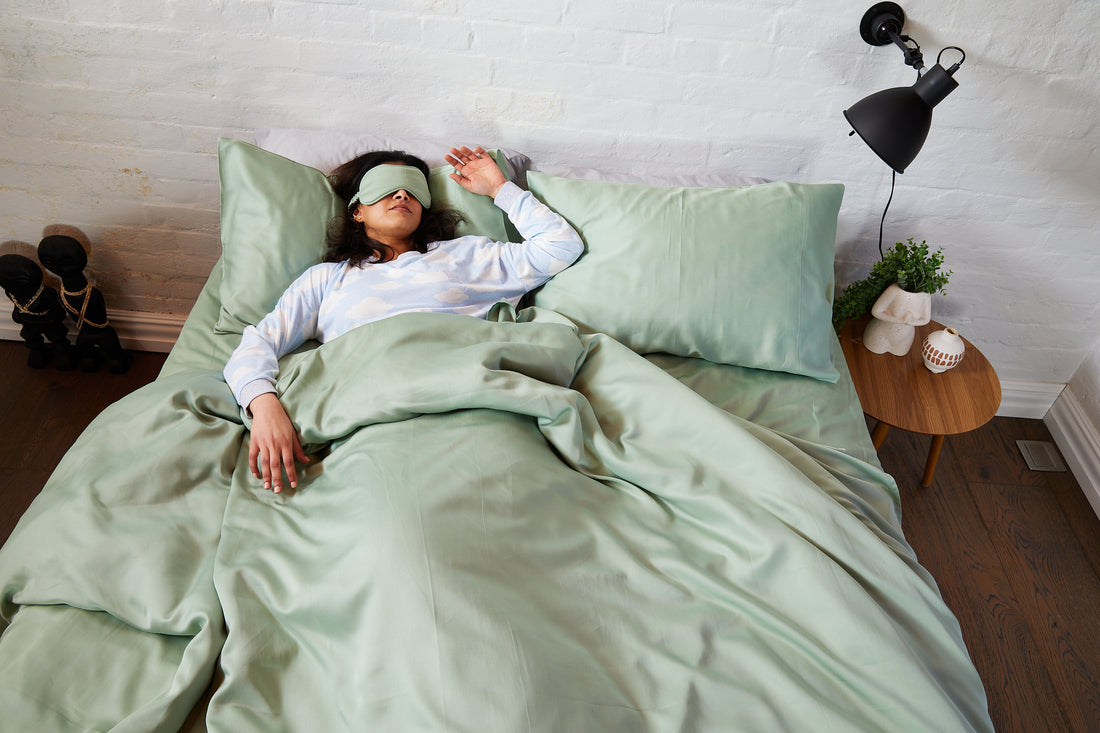
How to get a deep sleep
Share
For the longest time, humans believed that our body went into a dormant state during sleep i.e. the body and mind become inactive in order to recover from the day. It was only 70 years1 ago that we discovered our mind and body are anything but dormant when asleep. They work to restore, regenerate and process information while we sleep so that we can function well in our daily life.
A deep sleep, the star of this blog, is required for our body and mind to undergo a restorative process. Read along to find out more about what deep sleep is, how to get more of it and why it is important enough to have its own blog.
What is deep sleep?
When we sleep, our body goes through several sleep cycles. Each sleep cycle is made up of 4 stages2: Stages 1 - 3 are called NREM (non-rapid eye movement) sleep and Stage 4 is the well known REM sleep cycle.
Deep sleep, also known as Slow-Wave sleep, occurs in Stage 3. In this sleep stage, our pulse, breathing rate and muscle tone decreases letting our body be uber relaxed. This uber relaxed stage allows our body to restore, recover and grow. It helps to support the immune system and other body functions. There is evidence to suggest that despite reduced brain activity during this stage, a deep sleep bolsters memory, learning, creativity and insightful thinking3.

Image1: Stage 3 wave patterns indicate slow brain waves suggesting our thinking mind is most relaxed in this stage. Waking up from this stage can be more difficult than the other stages.
Sleep cycles can vary from person to person based on factors such as age, sleep environment, sleep patterns. It is estimated that average adults spend 13-23%1 of their total sleep time in the Deep Sleep stage. On the other hand, children need more time in this stage due to its critical role in growth and development.
How to get more deep sleep?
1. Allow yourself enough sleep time
In order for our body to cycle through the sleep stages and spend enough time in each stage, we need to allow ourselves adequate sleep time. Pretty straightforward, right?
It is recommended that an adult sleep 7-9 hours4 per night. Make sure to schedule sufficient sleep hours…that means if you need to wake up before the sun rises, don’t spend the night scrolling!
2. No blue lights please
Probably the most fave kind of lights in the 21st century - TV, mobiles, iPads, computers, laptops…they all expose us to the blue lights spectrum. Blue light can confuse our body into thinking it is day time. To get a deeper sleep, avoid exposure to blue light in the evening. Here’s some handy tips:
- Avoid using electronic devices 1-2 hours before bed time
- Red and orange bulbs can help to eliminate blue light exposure in the night
- Wear blue light blocking glasses when using electronic devices

JUSTIN STEFFMAN / SPLASH NEWS
3. Exercise, exercise, exercise
The chances of ‘exercise’ being in a ‘how to improve….’ blog is high. Rightly so! Regular physical activity is known to help with weight loss, stress reduction, anxiety, improved mood AND better quality sleep.
30 minutes of (moderate intensity) workout every day should do the trick. Avoid intense workouts right before sleep as it may have a negative effect on your quality of sleep.
4. Avoid big meals before bed
A large meal before bed can cause discomfort in the digestive system - cramps, acid reflux…all not conducive to a pleasant sleep. Instead, have a small snack before bedtime to balance sugar levels and encourage sleep.
5. Avoid caffeinated drinks
The opposite of sleep is caffeine (figuratively speaking!). Caffeine, nicotine, and alcohol make it harder to sleep during the night. Avoid consuming any caffeine at least 6 hours before bedtime.
6. Cool sleep & cooler bedding
The optimal bedroom temperature for good sleep is 18 degrees celsius5. When we sleep, our body’s core temperature slightly dips. A temperature-regulated room along with our cooling sheets, will help you to sleep comfortably and allow your body to go through the sleep cycles.
Bed&Butter Eucalyptus Sheet is highly breathable, promoting better temperature regulation for a cool and deep sleep. Total saviour for hot sleepers!

7. A bedtime routine
The aroma of relaxing essential oils, warm-dim light, soothing music, and nice book will help you unwind from the day and prepare you for a good night’s (deep) sleep. BRB…going to sleep!
In conclusion, a deep sleep is not only important for our body to relax and regenerate but also help bolster our key bodily processes. Plus, who doesn’t love a GOOD SLEEP. We sure do!
Any questions, reach out to us hey@bedandbutter.com.au
1 What is deep sleep - Block Blue Light
2 Sleep Stages - Sleep Foundation
